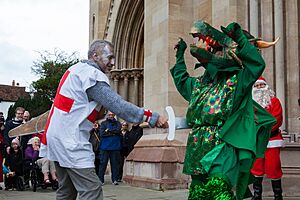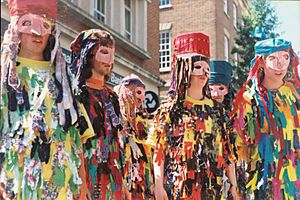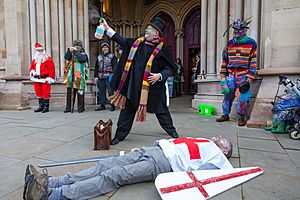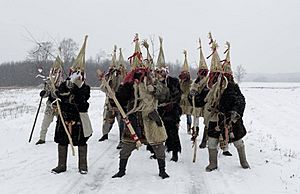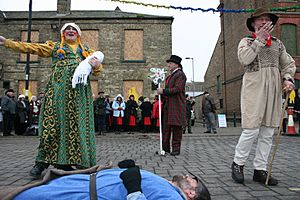Mummers' play facts for kids
Mummers' plays are fun folk plays performed by groups of amateur actors. These actors are called mummers or guisers. In the past, mummers were often all men. They would visit houses in costumes during holidays.
Today, a mummers' play usually has characters who come onto a stage. Two characters often have a pretend fight. The loser is then brought back to life by a doctor character. These plays are sometimes seen with a sword dance.
Mumming started in the British Isles. It then spread to places like Newfoundland. Mummers' plays are often performed outdoors or when visiting homes and pubs. They usually happen around Christmas, Easter, or on Plough Monday. Sometimes they are performed on Halloween. People often collect money during these performances.
The word mummer has been used since the Middle Ages. However, we don't have scripts from that time. The earliest written evidence of mummers' plays as we know them is from the late 1700s.
Contents
What are Mummers' Plays?
Mummers' plays were once popular across Great Britain and Ireland. They also spread to other English-speaking places. Today, a few traditional mummer groups still exist. Many new groups have also started. These often perform with morris and sword dance groups.
These plays are usually funny. The most common type features a doctor. This doctor has a special magic potion. It can bring the defeated character back to life.
Characters in the play might introduce themselves. They often use short speeches that rhyme. The main characters are usually a hero and an opponent. The hero is often Saint George, King George, or Prince George. In some areas, it's Robin Hood. His main opponent is often called the Turkish Knight or Slasher. Then there's the Doctor, who heals the injured character. Other characters can include Old Father Christmas, the Fool, and Beelzebub. Beelzebub often asks the audience for money.
Even though Saint George is often in the play, the Dragon rarely appears. It is usually just mentioned. In a few old plays, a dragon did appear and speak.
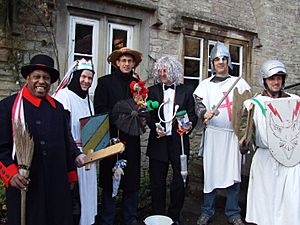
Mummer groups often wear hats or masks to cover their faces. Some mummers even blacken or paint their faces. In 1418, a law was made against wearing fake beards or painted faces during performances. However, many mummers today do not cover their faces at all.
Mumming was a way to earn money. The plays were performed at large houses. Many plays in southern England end with "Little Johnny Jack." He comes in with his "wife and family on his back." Johnny, often played by the youngest mummer, asks for food and then for money. His "wife and family" were usually dolls or a picture.
History of Mumming
Mummers and "guisers" (people in disguise) have been around since at least 1296. At that time, they performed for the marriage of Edward I's daughter. These early performances might have been like a masque. In 1377, 130 men on horseback went "mumming" to the Prince of Wales. They played a game of dice with the host for valuable items. After the game, they would dance with the guests.
In the 1500s, in Germany and Austria, masked people would visit houses during carnival. They offered a dice game. This custom was done by both common people and nobles.
The earliest full written play text with a "Doctor" character is from the mid-1700s. A very complete early version is from 1779 in Lincolnshire, England. Many more play texts were recorded in the 1800s.
Mumming was most popular in southern England in the late 1800s and early 1900s. Most traditional mummer groups stopped performing during the First World War. But many groups were brought back to life in the second half of the 1900s. Today, these revived plays are often performed around Christmas. The money collected usually goes to charity.
Different Types of Mummers' Plays
While most mumming happens around Christmas, some parts of England have plays at other times. These include around All Souls' Day (called Souling or soul-caking) or Easter (Pace-egging). In northeastern England, the plays are often linked with Sword dances.
In some areas, plays are performed on or near Plough Monday. These are called Plough plays. The performers are known by names like Plough-jags or Plough-bullocks. In the East Midlands of England, Plough plays have special characters. These include a Recruiting Sergeant and Tom Fool. Traditionally, ploughboys would perform these plays from house to house. They would get money or gifts. Some groups even pulled a plough. They would threaten to plough up gardens if they weren't paid!
England's Mummers' Plays
Around Sheffield and nearby areas, a play called the Derby Tup is performed. It's based on a folk song about a ram. Boys have been performing this play since at least 1895.
Another play, the Owd 'Oss (Old Horse), was known in Yorkshire. It involved a group of men with a hobby horse. This horse might have a wooden head with moving jaws. They would sing a song about an old horse close to death.
Irish Mummers' Plays
All known Irish play scripts are in English. However, Irish history and traditions are part of the mumming. Famous Irish characters like Saint Patrick and Oliver Cromwell can appear. The main characters usually include the Captain, Beelzebub, Prince George, the Doctor, and Miss Funny.
Mumming is still strong in parts of Ireland. These include County Fermanagh and County Wexford. The Catholic Church tried to stop the practice in the early 1900s. But it continued. In 1935, some mummers were even arrested for performing in the street! A festival is held every October in Fingal, Ireland, for mummers.
Scottish Mummers' Plays
In 1831, Sir Walter Scott wrote about a rhyme used for the Papa Stour Sword Dance in Shetland. It features seven characters, including Saint George. These characters are introduced one by one. There's no fight or cure in this version. Instead, the characters dance a longsword dance together. They form a "shield" with their swords.
Researchers like Emily Lyle and Brian Hayward have studied Scottish folk plays, known as Galoshins. These plays were performed mostly across the central part of Scotland.
Isle of Man Mummers' Plays
The Manx White Boys play was first recorded in 1832. It includes a song and a sword dance at the end. While it has traditional characters like St. George, modern versions often change the play. They can include characters about current events. This play is still performed every year on the Saturday before Christmas.
Philadelphia Mummers' Parade
In Philadelphia, USA, there's a huge Mummers' Day Parade every New Year's Day. It shows off amazing costumes and creativity. This parade started in 1900. Its roots go back to the mid-1600s. It mixes traditions from many European cultures.
In the 1800s, large groups of disguised young men would roam the streets on New Year's Day. They would have lively processions and demand drinks. By the 1880s, the city government started to organize these groups. They had to get permits and had leaders. By 1900, it became an organized parade with prizes. About 15,000 mummers perform in the parade each year. They are in four types of groups: Comics, Fancies, String Bands, and Fancy Brigades. All wear very detailed costumes. There's even a Mummers Museum in Philadelphia.
Mummers in Stories and Music
Mummers' plays have appeared in many books and songs.
- Thomas Hardy's novel The Return of the Native (1878) shows a mummers' play.
- Leo Tolstoy's novel War and Peace (1869) describes mummers visiting houses. They are shown as a loud, happy crowd in funny costumes. Men dress as women, and women as men.
- Ngaio Marsh's detective story Off with His Head (1957) is about a fictional "Dance of the Five Sons."
Several traditional songs are linked to mumming plays:
- "The Singing of the Travels" is a song performed by the Symondsbury Mummers.
- "A Calling-on Song" by Steeleye Span is based on a song that introduces characters in a play.
- "The Mummers' Dance" by Loreena McKennitt is a popular song about a springtime mummers' play in Ireland.
- "The Mummer's Song" by the Canadian group Great Big Sea is about the mummering tradition in Newfoundland and Labrador.
- Mummer is the name of a 1983 album by the band XTC.
See also
 In Spanish: Máscaras de Rumania para niños
In Spanish: Máscaras de Rumania para niños
- Balliol rhyme
- Clown
- Commedia dell'arte
- Jester
- Kukeri Mummers of Bulgaria
- Mystery play
- Pantomime
- Revels
- Wassailing
- Wrenboys
 | Chris Smalls |
 | Fred Hampton |
 | Ralph Abernathy |


